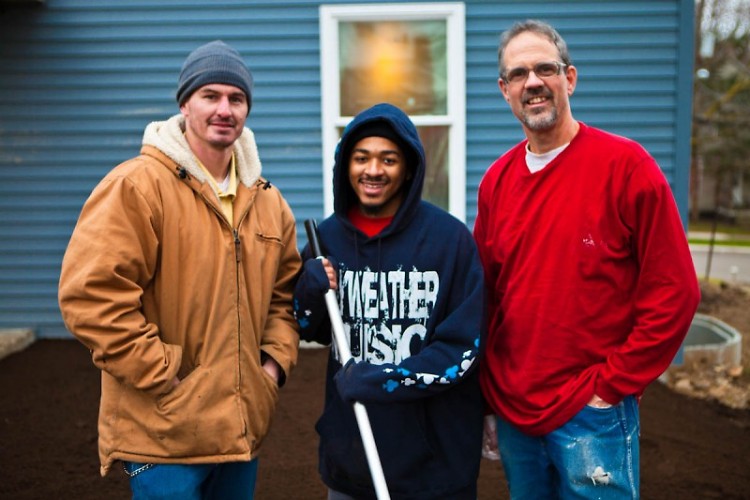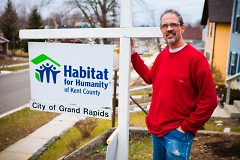It started when a speck of shingle stone landed in Michael Bradley's eye. Bradley was volunteering as one of Union High School's Habitat builders. While Bill Moerdyk, a Kent County's Habitat for Humanity staff, flushed out Bradley's eye, he made conversation with a few questions for the student. When Bradley talked about where he lives, Moerdyk recognized the street name. Before long it became clear that Michael Bradley was living in a Habitat house. "Yeah, you built my house," he revealed. Moerdyk remembers the mixed emotions well. "Here the poor guy has his head in his hands because of the stone in his eye, and I’m rejoicing."
The Bradley House
Vernell Bradley, Michael Bradley's mother, remembers when her family's house was being built and recalls "Michael was always interested in building houses. He was so excited when our home was being built and always tried to sneak on the site to help the builders with our home." To her son, it is a fond memory as well, even though he was only ten years old when his Habitat house was being built. "I felt happy. I tried [to help] but I was too young," said Michael Bradley.
Moerdyk reflects back on building the Bradley's home and remembers Vernell Bradley's enthusiasm during the experience. "Vernell, a real friendly, happy kind of person. It was a fun time working for her. Every Habitat house is exciting, but when the homeowner is excited like she was it adds to the air of the whole build. She was out there as often as she could get out there. Michael wanted to come out on the job, and I appreciated his willingness.” When the property was first purchased by Habitat for Humanity, Moerdyk says it was "sold to us almost as an unbuildable site." The Bradley family still lives in their Habitat house.
Paying it forward
Fast forward seven years to the present. Michael Bradley is a senior at Union High School, working with Habitat for Humanity in building a house for another family in Grand Rapids. His teacher, Eric Vanderberg, speaks highly of Michael Bradley. "He’s learned a lot and grown. He’s a dedicated individual. He doesn’t complain. When I ask him to do something, he does it." Moerdyk, a staff builder with Habitat for Humanity for over ten years, echoes that same sentiment. "He's calm, he does his work, and he’s diligent.”
Vanderberg, who works closely with his students on the job site, explains that there is a common thread between him and his students. “Half of these kids receive services for special education. Michael has a learning disability and I do too. And being that I have a learning disability it’s easier for me to communicate with these kids and understand what they need.” Vanderberg's relationship with Michael Bradley extends even past that common ground. “With some kids you can’t say this - that it’s like a big brother relationship. With Michael, I can say that.”
The learning disabilities of the students working on the job site have not affected their ability to work. "I have not found anybody who cannot be taught, if you take the time to teach them. [Other people] tell me they have learning disabilities but I have not seen that come out. A lot of it is just people taking the time to work with them," explains Moerdyk. Moerdyk finds his job rewarding in that “every day, I get an opportunity to impact people’s lives: homebuyers, volunteers, neighborhood, and my own. And the impact is almost always positive.”
Michael Bradley’s time on the job site has been rewarding as well. “It feels good because it makes me feel like I’m helping the community.” What he likes most about this opportunity is “helping out, building, and learning new things.”
Vanderberg also speaks to the students and their work on the job site. "To be out here with the kids and watch them learn...I went into teaching to help kids and I want to make sure they get what they need and prepare them for life."
What the future holds
While Bradley intends to keep building with Habitat for Humanity, he also has other dreams. Receiving a Habitat house and then building other people’s homes has inspired him to “go to Ferris State for building.” His mother says, “I am proud of my son and the work he is doing and I am thankful for Habitat for giving him the opportunity to realize his dreams.”
Moerdyk feels confident in Bradley’s abilities.
“I just wish the best for him. He’s got the energy [and the] desire.”
The Rapidian, a program of the 501(c)3 nonprofit Community Media Center, relies on the community’s support to help cover the cost of training reporters and publishing content.
We need your help.
If each of our readers and content creators who values this community platform help support its creation and maintenance, The Rapidian can continue to educate and facilitate a conversation around issues for years to come.
Please support The Rapidian and make a contribution today.



